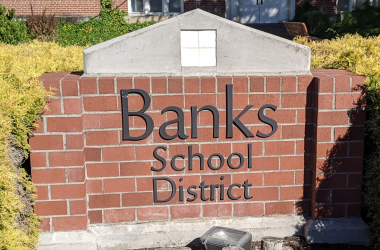This story originally appeared in the Oregon Capital Chronicle and is republished here under a CC BY-NC-ND 4.0 license. Read more stories at oregoncapitalchronicle.com.
Gov. Tina Kotek won’t veto a hotly debated bill to let more Oregonians pump their own gas, but she does plan to nix funding for studies on a Salem streetcar and decriminalizing prostitution.
Kotek on Friday released a list of bills she is considering vetoing and spending items she plans to run her red pen through, a notice she’s required to provide under the state Constitution. She’ll make her final decision by Aug. 4, the date by which she must sign or veto all bills passed by the Legislature or let them become law without her signature.
In a statement, Kotek said she spent the past month reviewing every bill, agency budget and appropriation. Lawmakers passed about 600 bills and approved a $31.9 billion budget this year, and Kotek has already signed most measures.
“While I understand and support the intent behind several of the items I’m considering vetoing, I am weighing concerns about implementation and budget prioritization,” she said.
The legislation and spending she intends to veto include:
- $600,000 to study sex work and the effect of decriminalizing prostitution. Senate Bill 5506, dubbed the Christmas tree bill because lawmakers piled miscellaneous spending on it like ornaments on a tree, contained funding for two different studies into sex work. Lawmakers authorized $500,000 for Oregon Health and Science University’s School of Public Health to study the effect of current laws on people engaged in sex work, as well as $100,000 for the Oregon Criminal Justice Commission to study advantages and disadvantages of decriminalizing prostitution. Kotek wrote that the studies had value but can and should be privately funded.
- $1 million for regional career and technical education programs provided by the Willamette Career Academy, based in Salem. Kotek said she supports career and technical education but that the funding should come through a local school district or education service district.
- $250,000 for Cherriots, Salem’s transit provider, to study the feasibility of developing a streetcar system in Salem. Kotek doesn’t believe it’s a top priority for the state, she wrote.
- House Bill 2079, which would have required the legislative revenue office to study implementing a tax credit and grant program to encourage preserving historic property. Such a study can and should be done without needing a law, Kotek concluded.
- House Bill 2763, which would have created a task force to study whether to establish a state bank. Kotek supports considering the idea, but the Oregon Business Development Department doesn’t have the time or resources to manage a new task force, she decided.
- And a delayed implementation for Senate Bill 1095, which adjusts memberships of boards and commissions to reflect Oregon’s new sixth congressional district. The Legislature added an emergency clause, meaning the bill would take effect immediately, but Kotek’s removal of the emergency clause means it will take effect on Jan. 1. She wrote that the delayed implementation would allow more time to recruit and vet new members of state boards.
Many Oregonians were more focused on a bill that didn’t make the veto list: House Bill 2426, which would allow gas stations throughout the state to offer self-service gas on up to half of their pumps, with the same prices for self-service and full-service pumps. Kotek has played coy for weeks about whether she supported the bill, asking for feedback from Oregonians and telling reporters Thursday to wait until her veto list came out Friday.
Lawmakers can override a veto with a two-thirds vote in both the House and Senate.






